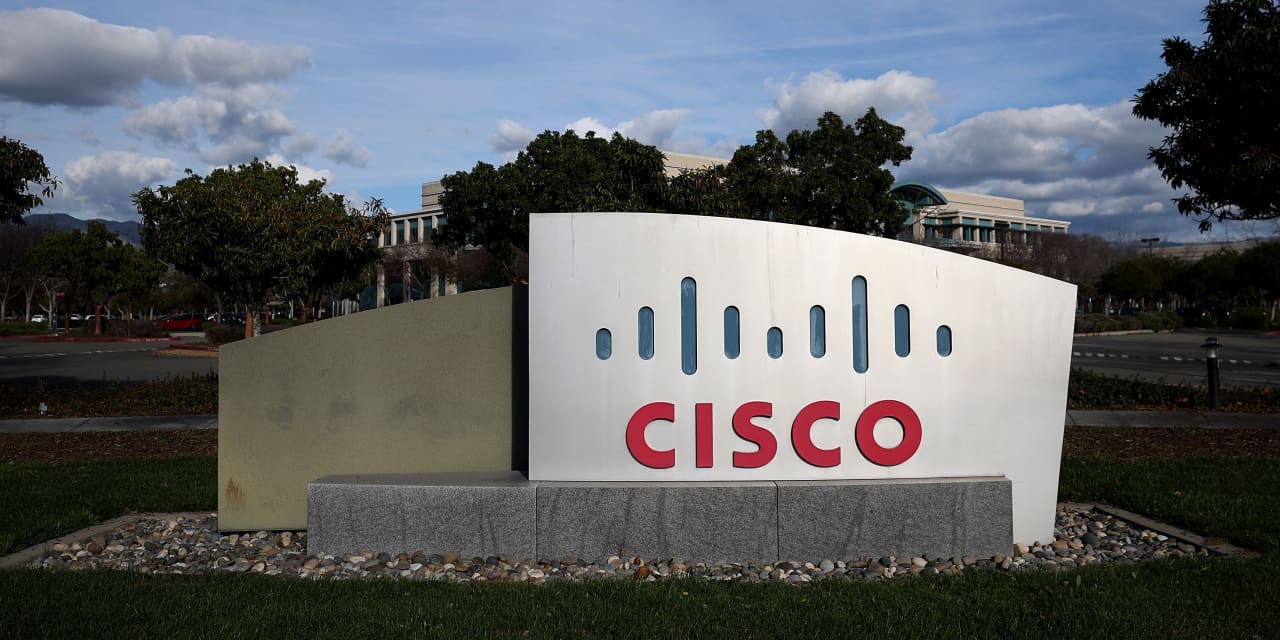Cisco Systems Inc. gave some more details on the timing of revenue from its anticipated orders related to artificial intelligence, and it looks like the networking giant is going to be a late bloomer in AI.
On Wednesday, Cisco
CSCO,
repeated comments from last quarter about a line of sight into $1 billion of orders related to products for building AI infrastructure for fiscal 2025. Cisco Chief Financial Officer Scott Herren told analysts on the company’s earnings call that he expects “the majority of that billion dollars in orders will turn into revenue in our fiscal 2025, just to be clear.” Cisco’s fiscal 2025 will begin this August and end in July 2025.
But the executives also said that in the past 90 days, that pipeline has continued to grow — and has actually tripled. By “pipeline,” Herren told MarketWatch in an interview, the company means opportunities its salesforce has identified in their constant communications with customers.
The comments about AI and its potential were a bright spot in a rather downbeat quarter, with disappointing guidance and news of a reduction of about 4,200 jobs, or about 5% of its workforce. Cisco also said it is seeing a “greater level of caution and scrutiny of deals,” leading to a lot of uncertainty from many companies.
Compared to some of its chip-making partners like Nvidia Corp.
NVDA,
and Advanced Micro Devices Inc.
AMD,
which have already reaped and forecast, respectively, multiple billions in revenue from AI-related chip sales, Cisco’s expectations are on a much smaller scale. Cisco reported $56.9 billion in revenue for fiscal 2023.
In the current infrastructure build-out for AI systems, the networking-standard technology used in the massive high-performance data centers is Infiniband, an Nvidia proprietary technology.
But that could change in the next year or so, as companies start to build their own internal infrastructures to support AI in their own proprietary data centers, in contrast to companies like Meta Platforms
META,
spending billions on an AI infrastructure to support its web services.
”Longer term, the people who are building out these big training models don’t want individual proprietary lock-in to a given protocol, and that’s what Infiniband is. That’s why you see [Nvidia CEO] Jensen [Huang] coming to us to say, ‘I want to partner with Cisco’ because he sees the same thing that we see, that ethernet ultimately will win in the space,” Herren said, referring to the industry-standard networking protocol. “Infiniband is there today. Ultimately ethernet will win in the space, not just on the front end, but also on the back end where the training is happening.”
Cisco’s current forecasts for revenue related to AI include very little product sales that will be generated by its recent partnership with Nvidia, and Herren described those eventual sales as a tailwind. “Enterprises will build out their own, they’ll use the web scalers for some of their AI needs,” he said, adding that companies will build out AI infrastructure for their own proprietary information and data that they want to keep secure. He declined to give any further projections on what kind of future revenue Cisco could reap as a result of its partnership with Nvidia.
“I wouldn’t do that quite yet, but there’s no question that it’s an upside force,” he said.
Cisco certainly has networking competitors who are all after the same slices of pie, namely companies that are looking at building their own internal AI-capable data centers. But it seems too early yet to write off the company as having missed the boat on AI.
Read the full article here


